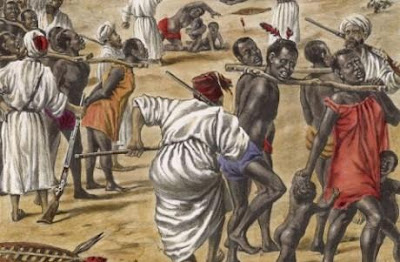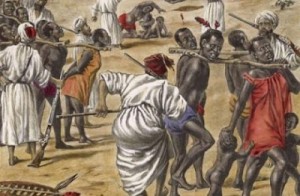How does Islam attest slavery?
Some people criticize Islam as to why this divine religion, with all its distinguished human values, did not abrogate slavery in its entirety and announce the freedom of all slaves by means of one decisive and general decree.
It is true that Islam has made numerous recommendations with respect to slaves, but what is of prime importance is their unconditional liberty and freedom. Why should a human be owned by another human and lose his freedom – the greatest divine gift?
In one short sentence it can be said that Islam has chalked out an accurate schedule for the freedom of slaves such that eventually not only would all of them gradually become free, but at the same time, this would take place without causing any adverse reaction within the society. In one short sentence it can be said that Islam has chalked out an accurate schedule for the freedom of slaves such that eventually not only would all of them gradually become free, but at the same time, this would take place without causing any adverse reaction within the society.
Islam’s Strategy for Liberating Slaves
Something that is not usually taken into account is that if an erroneous system penetrates into a society, it takes time to uproot it, and any uncalculated step would only yield an opposite result. This is similar to a person, who is afflicted with a dangerous disease which has reached a very advanced stage of its existence, or an addict, who has been addicted to drugs for decades; in such cases, it is imperative to employ phased and scheduled programs.
Speaking more plainly, if Islam, by means of one general order, had ordered the people to free all the slaves in one stroke, it was possible that most of the slaves might have possibly perished since, at times, they constituted nearly half of the population of the society. Coupled with this was the fact that, they had no source of income, no independent work, no dwelling and no means to lead their lives.
If all the slaves were to have become free on one day and at one particular hour, a huge unemployed group would have suddenly manifested itself within the society such that not only would it have placed itself in difficulty and endangered its own existence, but would have also thrown the entire discipline and order of the society into disarray. This is because when they experienced the pressures of deprivation, they would have had to resort to violence and aggression, and this would have led to dissension, skirmishes and bloodshed.
Therefore, it was vital that they became free and got absorbed into the society, gradually, so that neither did their own lives fall into peril nor did they threaten the peace and security of the society – and it was this calculated strategy that Islam pursued.
There are several parts to this strategy and the most important points from each of them shall be listed here, although briefly, since a detailed explanation demands that a separate and independent book is written for the purpose.
The First Part: Eliminating the Sources of Slavery
Throughout the ages, there have been numerous factors and causes of slavery. Debtors who were unable to pay off their debts, and prisoners of war, landed up as slaves. Power and strength provided a license for procuring slaves. Powerful nations would send their forces armed with various weapons to the backward nations of the African continent and other such regions, subjugate their inhabitants into captivity, transferring them in groups, by means of ships, to the markets of Asian and European countries.
Islam put its foot down upon these means and approved only one instance for slavery – prisoners of war. In addition, even this was not obligatory; it granted permission that, in accordance with the general welfare and expediencies they could be set free, either unconditionally or after payment of ransom.
In those days there were no prisons in which the prisoners of war could be held till their affairs were sorted out and hence, there lay no alternative except to retain them, by distributing them amongst the families as slaves.
It is self-evident that when these circumstances change, there exists no reason for the leader of the Muslims to adhere to the ruling of slavery in connection with the prisoners of war; rather, he is at liberty to set them free by way of favour or ransom. In this regard, Islam has authorized the leader of the Muslims to take into consideration the general welfare and all-round interests and then choose the course of action necessary. In this manner, the causes leading to further slavery were almost completely eliminated.
The Second Part: Opening the Door Towards freedom
Islam has chalked out an elaborate program for the freedom of slaves, and had the Muslims acted upon it, it would not have been very long before all the slaves had become free and absorbed within the Islamic society.
The main points of this program
1. One of the eight instances in which zakat can be expended in Islam is purchasing slaves and setting them free.3 In this manner, a perpetual and continuous budget from the Public Treasury has been allocated for this purpose and which shall continue till the complete freedom of all slaves is achieved.
2. In pursuance of the objective, provisions exist in Islam which permit the slaves to enter into an agreement with their masters and purchase their freedom by paying them from the wages which they earn (in Islamic jurisprudence, an entire chapter titled Mukatabah, has been devoted to this issue).4
3. Freeing slaves is regarded as one of the most important acts of worship in Islam and the Infallibles (a.s) always led the way in this issue, to the extent that in connection with Imam ‘Ali (a.s) it has been recorded that:
أَعتَقَ أَلفاً مِنْ كَدِّ يَدِهِ.
“He freed a thousand slaves by means of his wages (which he used to earn).”5
4. The Infallibles G used to free slaves at the slightest of excuses so that it serves as an example for the others, to the extent that when one of the slaves of Imam Baqir (a.s) performed a good deed, the Imam (a.s) said:
فَاذْهَبْ فَأَنْتَ حُرٌّ فَإِنِّي أَكْرَهُ أَنْ أَسْتَخْدِمَ رَجُلاً مِنْ أَهْلِ الْجَنَّةِ.
“Go, you are now free for I do not approve of a person from the inmates of Paradise to be my slave (and serve me).”6
It has been narrated in connection with Imam Sajjad (a.s) that once, his servant was in the process of pouring water over his (a.s) head when the vessel slipped from his hand and injured the Imam (a.s). The Imam (a.s) looked up at the servant whereupon, the servant recited:
وَ الْكَاظِمِينَ الْغَيْظَ
“…and those who restrain (their) anger.”7
Hearing this, the Imam (a.s) said: I have restrained my anger. The servant recited further:
وَ الْعَافِينَ عَنِ النَّاسِ
“…and pardon other people.”
The Imam (a.s) said: May Allah forgive you. The servant continued:
وَ اللٌّهُ يُحِبُّ الْمُحْسِـنِينَ
“…and Allah loves the doers of good (to others)”
whereupon the Imam (a.s) said: ‘Go. For the sake of Allah, you are (now) free.’8
5. In some of the traditions it has been stated that the slaves, after a period of seven years, would become free automatically, as we read in a tradition that Imam as-sadiq (a.s) said: One, who is a believer, becomes free after seven years – irrespective of whether his master approves of it or not. It is not permissible to extract services from a slave, who is a believer, after seven years.9
In this very chapter there is a tradition from the Noble Prophet (s.a.w) wherein he (s.a.w) says:
مَا زَالَ جَبْرَئِيلُ يُوصِينِي بِالْمَمْلُوكِ حَتَّى ظَنَنْتُ أَنَّهُ سَيَضْرِبُ لَهُ أَجَلاً يُعْتَقُ فِيهِ.
“Jibra`il used to make recommendations to me, with respect to the slaves, so often that I was given to suppose that he would shortly stipulate a time-period after which they would (automatically) become free.”10
6. If a person, who owns a slave in partnership, liberates him in the ratio of his share in the partnership, he is obliged to purchase the remaining part of the slave and liberate him fully.11
Moreover, if a person who owns a slave fully, frees a portion of the ownership, this freedom permeates into the other portions too and the slave becomes completely free, automatically!12
7. Whenever one becomes the owner of one’s father, mother, grand-fathers, sons, paternal and maternal uncles and aunts, brothers, sisters or nephews, they immediately (and automatically) become free.
8. If a master fathers a child by way of his slave-girl, it is not permissible for him to sell her and she must be later set free by utilizing the son’s share of the inheritance.
This issue became a cause for the freedom of a great number of slave-girls, since many of the slave-girls were like wives for their masters and had children from them.
9. In Islam, expiation of many of the sins has been stipulated by freeing slaves (expiation for unintentional murder, intentional abandonment of fasts, and for (breaking an) oath are some examples of this).
10. Some exceptionally harsh punishments have been singled out (by Islam) whereby if a master were to subject his slave to any of these, the slave would automatically become free.1314




